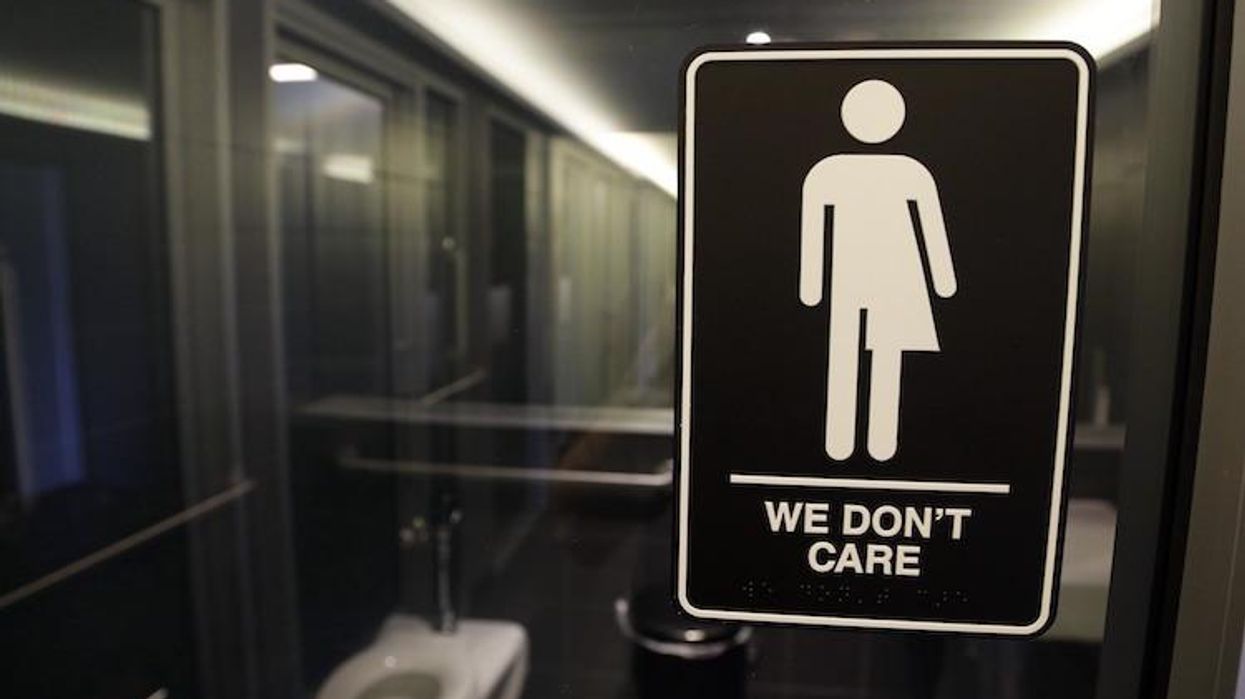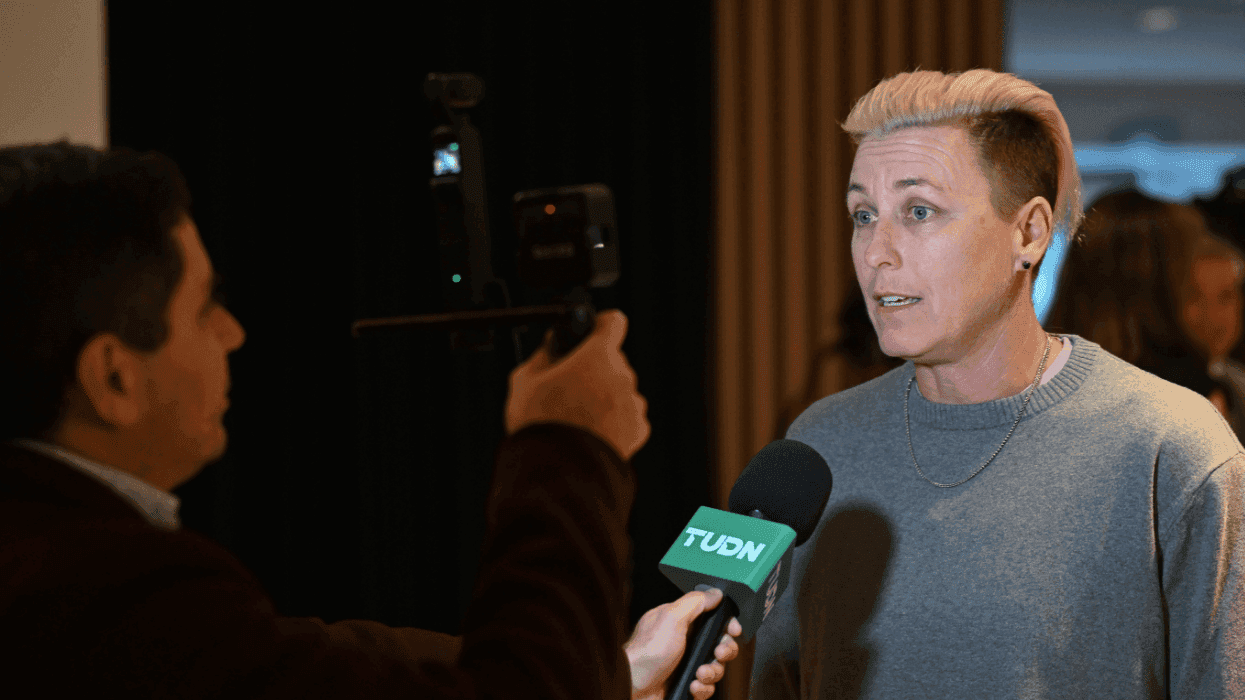As Linda Richman might say, the bipartisan "compromise" over repealing North Carolina's House Bill 2 was neither bipartisan nor a compromise.
Democrats and Republicans in the embattled state reached a so-called deal last week, nixing its anti-LGBTQ bathroom bill just hours before a crucial deadline that would have cost the state millions in potential revenue. The NCAA issued an ultimatum to the North Carolina legislature that if HB2 weren't struck down by the end of the month, it would forfeit the ability to host all March Madness games until 2022. House Bill 142 was signed on Thursday to keep the state's economy from continuing to freefall. A recent estimate from the Associated Press found that the state could lose as much as $3.76 billion in the next decade over the controversial legislation.
The resulting bill, though, is a disaster for North Carolina's LGBTQ community, one that does almost nothing to alleviate the harm caused by the transphobic legislation. That's because for legislators in the Tar Heel State, the year-long fight to overturn HB2 was never really about the safety of trans people, who just want to use the bathroom without fear of being harassed, beaten, or even sexually assaulted. It was about money.
The debate over HB2 illustrates the limitations of a political conversation that frames the basic human dignity of minority communities as about what's best for the bottom line. After HB2 was pushed through by the North Carolina legislature last March, more than 200 major companies called for a boycott of the state over the discriminatory bill, which forced trans people to use public bathrooms that corresponded with their legal gender identity when visiting government buildings and schools. Companies like PayPal and Deutsche Bank, both of which relocated planned expansions to North Carolina in protest of HB2, argued that bigotry is bad for business.
Related | NBA Yanks All-Star Game From Charlotte Over HB2
Of course, these companies were proven very right. In addition to the NCAA boycott, sporting leagues like the NBA and ACC pulled upcoming championship games that would inject millions into local economies. Bruce Springsteen, Ringo Starr, and Maroon 5 cancelled concerts. Stephen Schwartz, the composer of Wicked and Godspell, banned theater groups in the state from performing his shows until HB2 was eradicated.
Estimates on the economic impact of these decisions have varied. A September 2016 report from Wired found that North Carolina had shed $395 million since March--an average of $79 million a month. Over an entire year, that amounts to a whopping $1 billion in lost jobs and potential business. An estimate from UCLA's The Williams Institute, a pro-LGBTQ think tank, claimed the situation in North Carolina is even more dire: If HB2 were to remain the law of the land, it comes at a steep price of $5 billion every single year it's on the books.
The Associated Press was more modest in its forecast, but even the AP noted that its estimate was conservative and that reality would likely be much higher.
The human cost of that level of economic devastation--which would lead to hundreds of North Carolinians on unemployment--should not be ignored. What has received considerably less attention, however, is the penalty the LGBTQ community has paid for being singled out by its own government. Legislation like HB2 encourages violence against a population that is already extremely vulnerable to being victims of a hate crime. After President Trump repealed protections for trans students in March, three transgender women were killed in a single week. Just three months into the new year, eight trans people have already been murdered, which advocates attribute to a political climate that has emboldened violent intolerance.
Related | 8 Trans Women of Color Have Been Murdered in 2017
In North Carolina, an onslaught of reports attesting to increased vandalism and harassment show the real impact of scapegoating minority groups. Last June, a lesbian chef was thrown to the ground by a group of teenagers shouting obscenities at her on her way home from work. A transgender man said that women accosted him outside of a public restroom, grabbing him and lifting up his shirt to "check" his gender. Vandals spray-painted "DIE FAG" on the car of a gay man in Waynesville.
When a conversation that should be about protecting marginalized populations from brutality privileges profit over people, that's how we end up with an unrelenting political quagmire like HB2.
Widespread corporate scrutiny over the transphobic law, which also prevented local legislatures from enacting nondiscrimination ordinances in support of LGBTQ rights, led legislators to seek out a quick fix. They did what was necessary to prevent further damage to North Carolina's reputation. It did not encourage them to do what was right. Each previous version of a repeal law put forward by the General Assembly has left generous loopholes for right-wing extremists to further target queer and trans people. It was just a matter of determining how much discrimination was politically and economically viable.
Earlier iterations of an HB2 compromise would have replaced the legislation with policies just as devastating for North Carolina's LGBTQ community. GOP lawmakers in the General Assembly pushed a proposal that would have instituted an Indiana-style RFRA law allowing residents to sue the state government if they felt their constitutionally-mandated religious freedoms were being violated. Following criticism from groups like the American Civil Liberties Union and the Human Rights Campaign, negotiations broke down early last week. Gov. Roy Cooper, who conservatives claim had voiced his support for the repeal bill, pulled out prior to a scheduled press conference.
But HB 142, the legislation the General Assembly did agree upon, wasn't dramatically different from the killed proposal. Although there's no "religious liberty" provision, HB2 will effectively remain in place until 2020. The repeal prevents local legislatures from passing LGBTQ-inclusive protections, including bathroom accommodations, for the next 3 years. During that time, the state remains in charge of setting policies for all multi-stall public facilities.
Even though the bill is gone, almost nothing will change. It will not be legal for trans people to use the bathroom that corresponds with their gender identity, which will only lead to further scrutiny when using public restrooms. In a report from The Williams Institute, 60 percent of trans people report being shouted at or beaten when using either facility, and many were blocked from using the bathroom at all. Any solution that's designed to save face with the business community instead of advocating for the freedom of trans individuals to do their business safely isn't just unacceptable. It will risk the lives of countless people every day.
Full equality of the LGBTQ community will never be won if our movement does not stress our humanity first. Texas is currently considering its own clone of HB2, and Lt. Gov. Dan Patrick has made the passage of a bathroom bill his personal passion project. It faces a huge roadblock to passage in House Speaker Joe Straus, who opposes the bill. The conservative lawmaker, however, hasn't warned of the communities who would face increased abuse if Texas were to follow in North Carolina's footsteps. He's worried about the dollars and cents.
"I think we should be very careful about doing something that can make Texas less competitive for investment, jobs, and the highly skilled workforce needed to compete," Straus said at an event held by the Texas Association of Business, who claims the legislation would cost the state $1.7 billion.
It's heartening to see a Republican legislator standing up against discriminatory legislation, but it's worth inquiring: What if the bill weren't bad for the economy? Would Straus be okay with bigotry then? If powerful companies like Apple and Microsoft hadn't used their clout to oppose HB2, would the North Carolina legislature have even bothered to pass a repeal law--even a woefully misguided and ineffective one?
If the LGBTQ community even has to ask, we already know the answer.






























